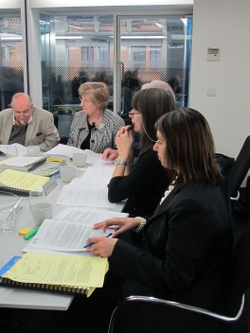Governance
 The Architects Act 1997
The Architects Act 1997
ARB was established by the Architects Act 1997; our role is to regulate the architects’ profession in the UK. We are an independent, public interest body and our work in regulating architects ensures that good standards within the profession are consistently maintained for the benefit of the public and architects alike.
Our sponsoring government department is the Department for Communities and Local Government (DCLG). The two bodies have established a Framework Agreement which sets out how both will operate including how and when ARB must report to DCLG. The Agreement sets out the responsibilities of DCLG, along with the responsibilities of the Board, the Board’s Chair, the Registrar and senior staff of ARB.
The Framework Agreement was reviewed at the end of 2012. To read the Agreement please click here.
The Board
ARB is governed by a Board which sets the strategic direction of the organisation and oversees the organisation’s performance. The Board is led by Beatrice Fraenkel as Chair and Richard Parnaby as Vice Chair. ARB has fifteen members on its Board, eight of whom are members of the public (lay members) appointed by the Privy Council, and seven are architects elected by their peers.
The current Board members are:
- Beatrice Fraenkel (Chair ARB)
- Richard Parnaby (Vice Chair ARB)
- John Assael
- Ruth Brennan
- Peter Coe
- Hans G Eisner
- Alan Jago
- Myra Kinghorn
- Ros Levenson
- Andrew Mortimer
- Arun Singh OBE
- Susan Ware
- Neil Watts
- Alex Wright
- Nabila Zulfiqar
Board tenure
During 2014, the government decided that in order to provide consistency and stability for the organisation during the Periodic Review process, the tenure of all Board members would be extended from three to four years. This amendment was made to the Architects Act 1997 via a Statutory Instrument which came into force on 10 February 2014.
Board Effectiveness Review
Good governance is at the heart of an effective Board. The chance to reflect on and discuss performance is central to making good decisions. Consequently, at the end of 2014, we undertook our second Board Effectiveness Review. Questionnaires were completed by the Board, the Board’s individual committees and appropriate advisers. A separate questionnaire including relevant questions was also completed by ARB’s Operational Management team. The purpose of the Effectiveness Review is to highlight areas of improvement and areas for future development. As a result of the responses submitted the Board agreed a number of actions including conducting follow-up evaluations of Board decisions where appropriate and allowing time for horizon scanning discussions.
The Accounting Officer
Karen Holmes, was Interim Registrar and Chief Executive during 2014 and was appointed as Registrar and Chief Executive of ARB in June 2015. In this role, she is responsible for the day-to-day management of the organisation and has specific responsibilities under the Act. The Registrar oversees a team of 22 who deliver the organisation’s core functions, and the objectives set out in the Board’s business plan. The Registrar is the designated Accounting Officer and so has a clearly-defined role in the safeguarding of and handling of public funds and the operation and management of ARB. These are detailed in the Framework Agreement document which sets out ARB’s relationship with DCLG, its sponsoring government department.
The seven principles of public life
As with all public bodies, all our Board members perform their tasks in accordance with the standards of public life, which underlie the Board members code. These were first set out by Lord Nolan in 1995. The seven principles are:
- Selflessness
- Integrity
- Objectivity
- Accountability
- Openness
- Honesty
- Leadership
Read more about the seven principles of public life.
Our commitment to and ability to operate in line with these values was no more apparent than during the Periodic Review process. Throughout this process Board members worked with the staff team to produce and unanimously agree an objective and considered evidence submission founded on the principles of effective regulation.

